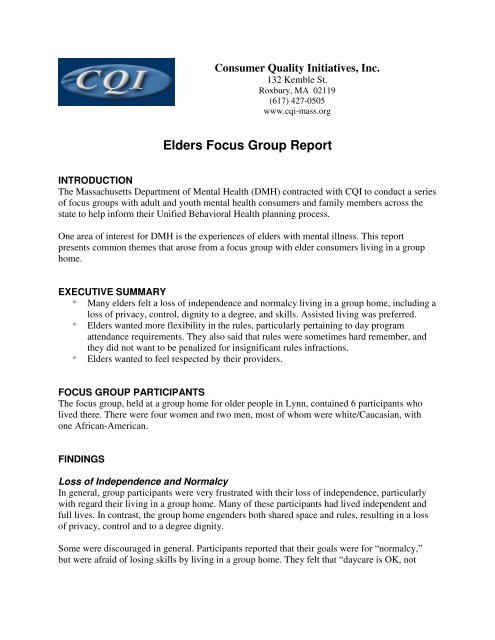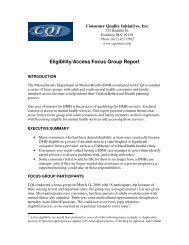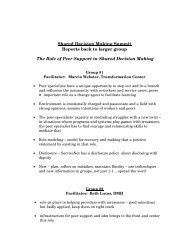Elders Focus Group Report - Consumer Quality Initiatives
Elders Focus Group Report - Consumer Quality Initiatives
Elders Focus Group Report - Consumer Quality Initiatives
You also want an ePaper? Increase the reach of your titles
YUMPU automatically turns print PDFs into web optimized ePapers that Google loves.
<strong>Consumer</strong> <strong>Quality</strong> <strong>Initiatives</strong>, Inc.132 Kemble St.Roxbury, MA 02119(617) 427-0505www.cqi-mass.org<strong>Elders</strong> <strong>Focus</strong> <strong>Group</strong> <strong>Report</strong>INTRODUCTIONThe Massachusetts Department of Mental Health (DMH) contracted with CQI to conduct a seriesof focus groups with adult and youth mental health consumers and family members across thestate to help inform their Unified Behavioral Health planning process.One area of interest for DMH is the experiences of elders with mental illness. This reportpresents common themes that arose from a focus group with elder consumers living in a grouphome.EXECUTIVE SUMMARY° Many elders felt a loss of independence and normalcy living in a group home, including aloss of privacy, control, dignity to a degree, and skills. Assisted living was preferred.° <strong>Elders</strong> wanted more flexibility in the rules, particularly pertaining to day programattendance requirements. They also said that rules were sometimes hard remember, andthey did not want to be penalized for insignificant rules infractions.° <strong>Elders</strong> wanted to feel respected by their providers.FOCUS GROUP PARTICIPANTSThe focus group, held at a group home for older people in Lynn, contained 6 participants wholived there. There were four women and two men, most of whom were white/Caucasian, withone African-American.FINDINGSLoss of Independence and NormalcyIn general, group participants were very frustrated with their loss of independence, particularlywith regard their living in a group home. Many of these participants had lived independent andfull lives. In contrast, the group home engenders both shared space and rules, resulting in a lossof privacy, control and to a degree dignity.Some were discouraged in general. Participants reported that their goals were for “normalcy,”but were afraid of losing skills by living in a group home. They felt that “daycare is OK, not
much of a choice.” They were discouraged that they would be on medications for the rest of theirlife.Assisted living (own bathroom with areas to spend time with people and share food) wasconsidered preferable to a group home, but they knew it was more expensive.RulesMost participants understood the reasons for house rules, and the challenges of providingindividualized care in group settings. However, several felt that rules were sometimes appliedarbitrarily. For example, residents might be required to attend a day program 4 days a week, butseveral would prefer to attend less in order to reduce the intensity of interactions with otherprogram attendees (whom they may not like) and/or to take care of cleaning or other work athome. They felt there should be more “wiggle room” with regard to how often then need toattend a program. That is, they did not believe in “strict” rules, as it does not allow them toalways be treated as individuals.The other thing about rules is that they can be difficult to remember, particularly for elders.Thus, they generally did not believe that people should be penalized for breaking rules.Respectful TreatmentParticipants also described the need for respectful treatment. They don’t want to “talked downto” or ordered around.One woman sees a psychiatrist who does not make any eye contact with her, but instead looksdown and writes notes, even as she enters into the room. She asked him to look at her whentalking to her, and the psychiatrist responded that maybe she should find a new psychiatrist.Clinicians and staff need to remember that elders are sensitive to a loss of respect, and treat themas they would other any other human being they cared about.2




